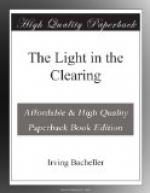The day came, shortly, when I had to speak out, and I took the straight way of my duty as the needle of the compass pointed. It was the end of a summer day and we had watched the dusk fill the valley and come creeping up the slant, sinking the boulders and thorn tops in its flood, one by one. As we sat looking out of the open door that evening I told them what Sally had told me of the evil report which had traveled through the two towns. Uncle Peabody sat silent and perfectly motionless for a moment, looking out into the dusk.
“W’y, of all things! Ain’t that an awful burnin’ shame-ayes!” said Aunt Deel as she covered her face with her hand.
“Damn, little souled, narrer contracted—” Uncle Peabody, speaking in a low, sad tone, but with deep feeling, cut off this highly promising opinion before it was half expressed, and rose and went to the water pail and drank.
“As long as we’re honest we don’t care what they say,” he remarked as he returned to his chair.
“If they won’t believe us we ought to show ’em the papers—ayes,” said Aunt Deel.
“Thunder an’ Jehu! I wouldn’t go ‘round the town tryin’ to prove that I ain’t a thief,” said Uncle Peabody. “It wouldn’t make no differ’nce. They’ve got to have somethin’ to play with. If they want to use my name for a bean bag let ’em as long as they do it when I ain’t lookin’. I wouldn’t wonder if they got sore hands by an’ by.”
I never heard him speak of it again. Indeed, although I knew the topic was often in our thoughts it was never mentioned in our home but once after that, to my knowledge.
We sat for a long time thinking as the night came on. By and by Uncle Peabody began the hymn in which we joined:
“Oh, keep my heart
from sadness, God;
Let not its sorrows
stay,
Nor shadows of the night
erase
The glories of the day.”
“Say—by thunder!—we don’t have to set in the shadows. Le’s fill the room with the glory of the day,” said Uncle Peabody as he lighted the candles. “It ain’t a good idee to go slidin’ down hill in the summer-time an’ in the dark, too. Le’s have a game o’ cards.”
I remember that we had three merry games and went to bed. All outward signs of our trouble had vanished in the glow of the candles.
Next day I rode to the post-office and found there a book addressed to me in the handwriting of old Kate. It was David Hoffman’s Course of Legal Study. She had written on its fly-leaf:
“To Barton Baynes, from a friend.”
“That woman ’pears to like you purty thorough,” said Uncle Peabody.
“Well, let her if she wants to—poor thing!” Aunt Deel answered. “A woman has got to have somebody to like—ayes!—or I dunno how she’d live—I declare I don’t—ayes!”
“I like her, too,” I said. “She’s been a good friend to me.”
“She has, sart’n,” my uncle agreed.




